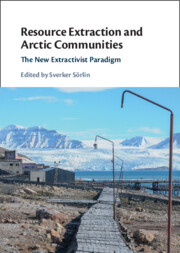Acknowledgments
This book is the result of a great team effort lasting over seven years, from developing the original research design through a long period of research in the field, in archives and libraries, and including many small and large publishing endeavors, through to this volume. It tries to bring a mass of results together into a more coherent image of state-of-the-art knowledge on Arctic resource extraction.
As editor, I would like to acknowledge the research that lies behind all chapters. I am deeply grateful to all authors for the effort they have put in. I also owe a big and heartfelt thanks to my editorial assistant, Élise Lépy, herself a scholar and contributor to two of the chapters. In addition, Élise has worked with me for more than a year, making sure that maps, illustrations, and captions were organized appropriately, and that orthographical principles and style guide instructions were duly observed. On top of that, it has been a pleasure!
As a collective, all authors have been, directly or indirectly, dependent on the generous support of NordForsk, our primary funding agency for the research undertaken toward this volume. The bulk of our work has been carried out under the NordForsk Center of Excellence, REXSAC – Resource Extraction and Sustainable Arctic Communities, with KTH Royal Institute of Technology in Stockholm as the hosting institution. At NordForsk in Oslo, then-Director Gunnel Gustasson worked tirelessly over several years to mobilize funds for the NordForsk Arctic program, Responsible Development of the Arctic – Opportunities and Challenges – Pathways to Action. The program was launched in 2015 with a total budget of some 12 million Euros, a tremendous achievement from which the REXSAC CoE benefitted, along with three other CoEs working in parallel.
Key to the success was the constructive support from the NordForsk program officers, Marianne Røgeberg in the preparatory and start-up phases, and since 2018 Kyösti Lempä. An additional source of inspiration and support – and challenge! – was the international Scientific Advisory Board, chaired by Professor Douglas C. Nord, Umeå University, Sweden. En route, Doug took it upon himself to coordinate and edit a NordForsk Arctic program–wide collection, entitled Nordic Perspectives on the Responsible Development of the Arctic: Pathways to Action (Springer Nature, 2021), a book that allowed us to get our heads together and test some of the ideas that we have explored in depth in the present volume.
Outside the team of authors, several members of the CoE as a whole have contributed to the work in myriad ways. In different constellations, the authors and other REXSAC co-workers, including Indigenous and community representatives, have conducted fieldwork, PhD training courses, and excursions to multiple locations of mining, energy production, and other forms of resource extraction and their surrounding communities. On such occasions, we have been thoughtfully and convivially taken care of by colleagues and local experts. Among those were Britt Kramvig in Alta and Urban Wråkberg in Kirkenes, Norway; Malin Brännström in Arjeplog, Åsa Allan in Pajala, Anders Forsgren in Gällivare, and Nina Eliasson, Clara Nyström, and Niila Inga in Kiruna, all in Sweden; Vili Kurki, Mikko Lipponen, Jaana Koivumaa, Élise Lépy, and Hannu I. Heikkinen in Kolari, Finnish Lapland; Joan Nymand Larsen and Jón Haukur Ingimundarson in Akureyri, Iceland; Mark Nuttall, Lene Kielsen Holm, and Erik Kielsen in Narsassuaq, Narsaq, Arsuk, Ivittuut, and Josva, Greenland; Thierry Rodon, Aude Therrien, Jean-Sébastien Boutet, and Arn Keeling in Schefferville and Labrador City, Québec, and Réal Mckenzie, Matimekush Lac-John, all in Canada.
Additional funding toward this mega-enterprise has come from many sources, including the European Research Council (ERC), the Academy of Finland, the Icelandic Center for Research (RANNIS), the Swedish Research Council (VR), the Swedish Research Council for Sustainable Development (Formas), the Research Council of Norway (RCN), the Nordic Council of Ministers (NCM), the Canadian Social Sciences and Humanities Research Council (SSHRC), and several foundations and other funding bodies.
Maps were designed by Christian Fohringer and Carl Österlin in collaboration with Élise Lépy, except maps in Chapter 9 that were drawn by Sandra Fischer and Dag Avango. At Cambridge University Press in Cambridge, our editor Sarah Lambert answered all our questions and assisted promptly and kindly all along. I would like to thank three anonymous reviewers who at the request of the publisher provided constructive comments on the book proposal that helped develop the project in an early phase and facilitated the book finding its current form. Finally, I would like to express our heartfelt respect and gratitude from the entire project team to the memory of Lene Kielsen Holm, Nuuk, who left us in 2021. Lene’s work in REXSAC and over a long career as a renowned international scholar and as a member of her Indigenous community in Greenland has meant a lot to the project while standing out as an exemplar to the world of how responsible collaboration can make an impact and build community and friendship.

